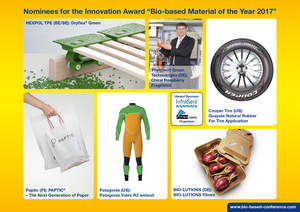HURTH,GERMANY--(Marketwired - Mar 31, 2017) - For the tenth year in a row, the Innovation Award "Bio-based Material of the Year" will be awarded to the young, innovative bio-based material industry, finding suitable applications and markets for bio-based products. The competition focuses on new developments in these areas, which have had (or will have) a market launch in 2016 or 2017. The winners will be elected by the participants of the International Conference on Bio-based Materials, 10-11 May 2017 in Cologne, Germany. The Award is sponsored by InfraServ GmbH Knapsack. www.bio-based-conference.com
The "Top 6" candidates are:
BIO-LUTIONS (DE): BIO-LUTIONS fibres (up-cycled agricultural residuals)
Converted into self-binding natural fibres, this innovation lets the contaminating and energy-intense process of cellulose extraction to be a thing of the past. The final products can either decompose under normal conditions, be used for biogas production and can be recycled or burned with a nearly CO2 neutral carbon footprint.
Cooper Tire (US): Guayule natural rubber for tire application (guayule polymer - polyisoprene)
Cooper shows the first ever concept tire where all of the natural and synthetic rubber has been replaced with guayule.
Hexpol (BE/SE): Dryflex® Green (bio-based thermoplastic elastomer)
Hexpol's new family of TPE is highly customisable, opening up previously unreachable solutions to the bio-based thermoplastic market by covering a wider range of hardnesses, including softer grades, while incorporating high levels of renewable content to over 90%.
Paptic® (FI): PAPTIC® - the next generation of paper (novel renewable, recyclable and reusable material)
Paptic® is replacing oil based plastics with bio-based, recyclable and reusable PAPTIC® material, which uses a novel wood fibre for a bioplastic composite paper combining the benefits of paper, plastics and textiles.
Patagonia (US): Yulex R3 wetsuit (85% natural rubber/15% synthetic rubber by polymer content, recycled polyester content in linings)
Patagonia launched the world's first neoprene-free wetsuit, reducing their CO2 emitted in the polymer manufacturing by up to ~80% compared to conventional neoprene.
Phytowelt GreenTechnologies (DE): Chiral raspberry fragrance (®-alpha-Ionone)
Phytowelt's raspberry fragrance is chiral pure, smells intensive and is, because of the biotechnological production, a natural flavour component. This raspberry fragrance is the first natural in the market which can be produced in high quantity as well as quality.
More information about the six candidates: www.bio-based-conference.com/award
Internet: www.nova-institute.eu - all services and studies at www.bio-based.eu
nova-Institute is a private and independent institute, founded in 1994; nova offers research and consultancy with a focus on bio-based and CO2-based economy in the fields of feedstock, techno-economic evaluation, markets, sustainability, dissemination, B2B communication and policy. Today, nova-Institute has 25 employees and an annual turnover of more than 2.5 million EUR .
Contact Information:
Responsible under press legislation (V.i.S.d.P.):
Dipl.-Phys. Michael Carus
Managing Director
nova-Institut GmbH, Chemiepark Knapsack, Industriestrasse 300, DE-50354 Hurth (Germany)
Email: contact@nova-institut.de
Phone: +49 (0) 22 33-48 14 40
